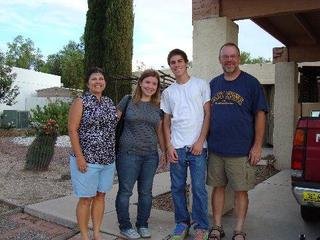An Old Woman with a Rosary
The poet Joachim Gasquett tells us that this is a portrait of an ex-nun, who lost her faith and "escaped" from her convent. Gasquett found her wandering aimlessly and provided shelter for her. In Cézanne's portrait, she looks back upon a life that must have had significant pain and inner torment. And as she looks forward, she knows the days remaining to her are dwindling rapidly. So it is appropriate that the colors are somber.
[http://www.arttoheartweb.com/cezanne.htm]
But where is the light in this portrait? It is not in the hands that hold the rosary; the tool for prayer. The light is in the face. The face reflects the interior life of the woman. The face is the focus of light in the painting and her eyes are open and her eyebrow is raised with a hopeful expression.
How can this woman who has undoubtedly known so much turmoil, suffering, doubt, and anguish be hopeful at the end of her days? How? Why does she turn to prayer for her consolation, when she apparently lost her faith? Is it just a comforting habit? Is it the comfort of routine? If this was what Cezanne wanted to express, would there have been light and indications of hope in the painting? Probably not.
Cezanne was telling us that there is consolation in Christ; there is hope in Christ; and that anyone can come to Christ. Cezanne was a very religious man, a devout Catholic. You would think that we would turn away from this woman who was more than a “lapsed” Catholic—she had denied her faith, she had broken her vows. But in the simple act of prayer, this woman found her peace; her consolation in Christ. She was a member of no church, she had no organized religion. She had the religion of the heart; and in this she found the peace of Christ.
Look at Matthew 11.28-30: ‘Come to me, all you that are weary and are carrying heavy burdens, and I will give you rest. Take my yoke upon you, and learn from me; for I am gentle and humble in heart, and you will find rest for your souls. For my yoke is easy, and my burden is light.’
This is not the prevalent view of faith, of religion. For many people, religion or faith is burdensome. It is filled with do’s and don’ts and people are always judging you, and on top of all you have to do to get by in this life, you have a new set of demands: God’s demands. Either conventional wisdom (sometimes supported by a 1000 years of tradition is right or Jesus is right.
Who was Jesus talking to? People who were tired of carrying their burdens. What kinds of burdens do we carry?
our past
our sins
our worries
our hurts
our bitterness
our regrets
our failures
our what ifs and if onlys
our doubts
our confusion
our uncertainty
Jesus offers you rest. This is not necessarily the rest of inactivity, but it is certainly rest from struggle. We are meant to live following God’s way, the path of Jesus. This will be liberating for us. Restful. It will be like coming home.
Jesus asks that we come to him. Jesus asks that we enlist ourselves with him. Jesus asks that we learn his ways. This is how we will find rest. This is how we will find consolation.
Notice what Romans 8.12-16 says. When we live according to the Spirit, the inner witness in our souls is given voice and is strengthened.
1 John 3.14-24 tells us that practical acts of love will resonate in our souls that we belong to God.
A video of Cezanne's works is here.
The worship bulletin is here.

No comments:
Post a Comment